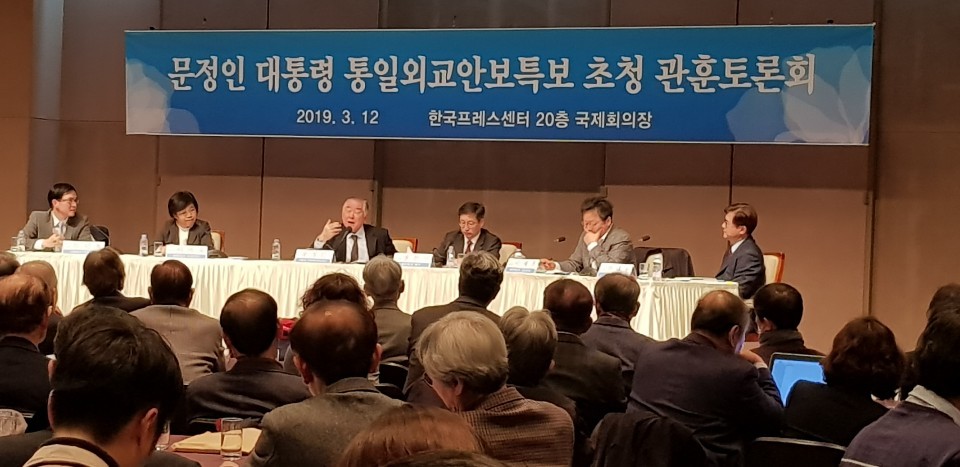 |
|
Moon Chung-in, South Korean special presidential advisor for unification, foreign affairs and national security, speaks at a Kwanhoon Club invitational panel discussion at the Korea Press Center in Seoul on Mar. 12. (provided by the Kwanhoon Club)
|
Moon Chung-in speaks at panel discussion on current deadlock in denuclearization negotiations
“The US needs to not commit the same mistake from 2002 [which triggered the second North Korean nuclear crisis]. North Korea needs to not mess things up by using military activities [including a possible rocket launch from Tongchang Village] as negotiating leverage.” Moon Chung-in, South Korean special presidential advisor for unification, foreign affairs and national security, stressed the need for both North Korea and the US to “avoid the butterfly effect where one small action leads to a serious disaster.” The Yonsei University emeritus professor spoke at a Kwanhoon Club invitational panel discussion at the Korea Press Center in Seoul on Mar. 12. Commenting on the US’ insistence on a package deal approach of denuclearization coming before any rewards during the second North Korea-US summit in Hanoi, Moon said, “A realistic approach would be to start by dismantling the nuclear facilities at Yongbyon.” According to Moon, the lesson of the second North Korean nuclear crisis – which occurred early in the George W. Bush administration when the US backed out of its Agreed Framework with the North over allegations that it was operating a highly enriched uranium program, prompting an outcry from Pyongyang – suggests starting with the Yongbyon dismantlement would be more realistic than the “big deal” approach, of which North Korea has been dismissive. Moon also remarked on “unusual activity” recently detected at the Tongchang Village launch site. “At the moment, it’s all speculation, so we can’t state any conclusions about the intent,” he said. “In any event, this sort of activity is not desirable, and it would be best for the North to refrain from it,” he added. 3-party or 4-party summit at UN General Assembly could turn around post-Hanoi panic As a way of resolving the political situation in the wake of the Hanoi summit, Moon proposed South Korean President Moon Jae-in and North Korean leader Kim Jong-un holding a “one-point summit” in Panmunjom, followed by another summit between Moon and US President Donald Trump and an eventual three-party (South and North Korea and the US) or four-party (South and North Korea, the US and China) summit around the time of the UN General Assembly meeting in September. “It isn’t good to rush things too much, but there’s also the risk of losing momentum if things get too backed up,” Moon Chung-in said. “It won’t be easy, but if we hold a three-way or four-way summit at the UN General Assembly meeting, it could be good concept for turning around the post-Hanoi panic,” he added. Moon went on to stress that “a successful conclusion to the US-China trade talks is of paramount importance,” adding that this would “allow Trump and [Chinese President] Xi Jinping to cooperate and allow Xi to actively intervene in Korean Peninsula issues.” “If that happens, we can start looking for a new path,” he predicted. Moon also said blame for the Hanoi summit failing to produce an agreement could be placed on “the national interests of North Korea and the US.” “North Korea behaved in a predictable fashion in Hanoi, while the US behaved unpredictably,” he noted. “In that sense, the North must have been quite disappointed,” he added, implying that Washington effectively bears a larger share of the blame. Early on in the panel discussion, Moon commented that the US “bears more of the blame” and that Washington “appears to have been the side that upset the apple cart.” Toward the middle of the discussion, he said, “I officially take back my remarks. Both sides are to blame.” Moon also predicted that it would be “extremely difficult to put things back together once North Korea-US dialogue becomes derailed.” “President Moon needs to be given the leverage to promote North Korea-US negotiations and room to adopt flexible policies regarding inter-Korean economic cooperation [including tourism at Mt. Kumgang and reopening the Kaesong Industrial Complex],” he added. By Lee Je-hun, senior staff writer Please direct comments or questions to [english@hani.co.kr]






